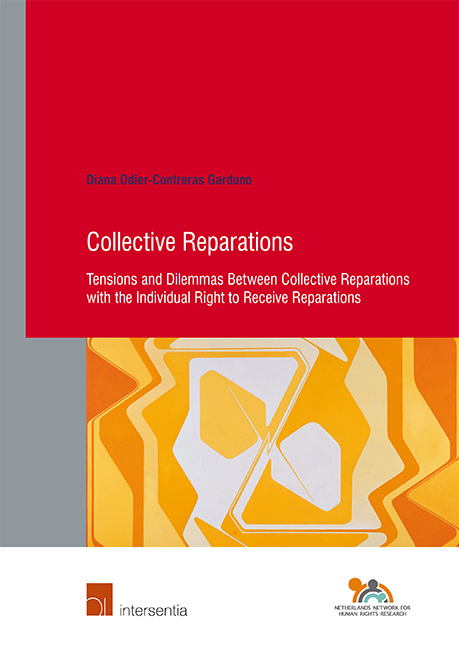 Collective Reparations
Collective Reparations Book contents
- Frontmatter
- Acknowledgments
- Table of Contents
- Abbreviations
- Chapter I Introduction
- Chapter II Developments Concerning the Right to Reparation
- Chapter III Collective Reparations at the Inter-American Court of Human Rights
- Chapter IV Collective Reparations in International Criminal Law
- Chapter V Collective Reparations & Non-Judicial Bodies
- Chapter VI Conclusions
- Samenvatting
- Resumen
- Résumé
- Bibliography
- Table of Instruments
- Table of Cases, Decisions and Filings
- Curriculum Vitae
- Human Rights Research Series
Chapter II - Developments Concerning the Right to Reparation
Published online by Cambridge University Press: 31 January 2019
- Frontmatter
- Acknowledgments
- Table of Contents
- Abbreviations
- Chapter I Introduction
- Chapter II Developments Concerning the Right to Reparation
- Chapter III Collective Reparations at the Inter-American Court of Human Rights
- Chapter IV Collective Reparations in International Criminal Law
- Chapter V Collective Reparations & Non-Judicial Bodies
- Chapter VI Conclusions
- Samenvatting
- Resumen
- Résumé
- Bibliography
- Table of Instruments
- Table of Cases, Decisions and Filings
- Curriculum Vitae
- Human Rights Research Series
Summary
Introduction
Reparations play an important role in upholding the rule of law, restoring equality, and providing remedial justice to those harmed as a result of a breach of an international obligation. The essential role and importance of reparations within any legal system is perhaps best described by Justice Guha Roy: ‘[t]hat a wrong done to an individual must be redressed by the offender himself or by someone else against whom the sanction of the community may be directed is one of those timeless axioms of justice without which social life is unthinkable’. Although the idea that the consequences of a wrongdoing should be adequately redressed was first established under domestic jurisdiction, the international legal framework has extensively developed the content and scope of redressing wrongful acts. Primarily, the laws of state responsibility, as interpreted and developed by the International Court of Justice (ICJ) that is the ‘supreme public international law tribunal’, have played a major role in shaping the content of reparations. The laws of state responsibility codified the most common forms of reparation used under international law during the last 200 years. In addition to the ICJ's key role in the creation and interpretation of international law in general, international human rights law8 has significantly influenced the international legal framework governing reparations.
This chapter provides an overview of the main characteristics of reparations and their development as both a state obligation stemming from internationally wrongful acts and as an individual human right. The chapter opens with a brief explanation of how reparations form one of the two elements of the right to a remedy within the framework of both public international law and international human rights law. It continues with a discussion on the most important developments of the law and practice that underpin reparations in public international law. In particular, it focuses on the law of state responsibility and the landmark cases related to reparations from the International Court of Justice. The chapter also takes a human rights perspective to discuss the most relevant law on and the practice of awarding reparations. In doing so, it focuses primarily on the jurisprudence of the two main regional judicial bodies: the Inter-American Court of Human Rights and the European Court of Human Rights. These two courts have each produced a vast body of case law on remedies and reparations.
- Type
- Chapter
- Information
- Collective ReparationsTensions and Dilemmas Between Collective Reparations and the Individual Right to Receive Reparations, pp. 33 - 120Publisher: IntersentiaPrint publication year: 2018
